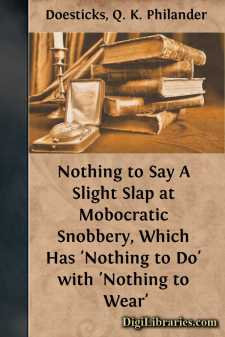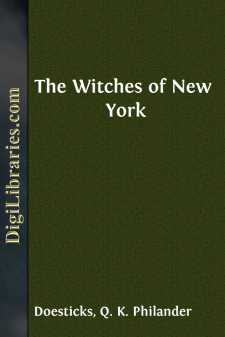Categories
- Antiques & Collectibles 13
- Architecture 36
- Art 48
- Bibles 22
- Biography & Autobiography 813
- Body, Mind & Spirit 142
- Business & Economics 28
- Children's Books 14
- Children's Fiction 11
- Computers 4
- Cooking 94
- Crafts & Hobbies 4
- Drama 346
- Education 46
- Family & Relationships 57
- Fiction 11829
- Games 19
- Gardening 17
- Health & Fitness 34
- History 1377
- House & Home 1
- Humor 147
- Juvenile Fiction 1873
- Juvenile Nonfiction 202
- Language Arts & Disciplines 88
- Law 16
- Literary Collections 686
- Literary Criticism 179
- Mathematics 13
- Medical 41
- Music 40
- Nature 179
- Non-Classifiable 1768
- Performing Arts 7
- Periodicals 1453
- Philosophy 64
- Photography 2
- Poetry 896
- Political Science 203
- Psychology 42
- Reference 154
- Religion 513
- Science 126
- Self-Help 84
- Social Science 81
- Sports & Recreation 34
- Study Aids 3
- Technology & Engineering 59
- Transportation 23
- Travel 463
- True Crime 29
Q. K. Philander Doesticks
Q. K. Philander Doesticks was the pen name of Mortimer Thomson, a 19th-century American humorist and journalist. He gained fame with his satirical writings, especially in the book "Doesticks: What He Says," a collection of humorous essays published in 1855. Thomson's work often parodied popular culture, politics, and social norms of his time, using wit and absurdity to entertain his audience. He also co-authored "Plu-ri-bus-tah: A Song That's by No Author," a satire on the epic poem "Hiawatha" by Henry Wadsworth Longfellow.
Author's Books:
Sort by:
I, Q. K. P. Doesticks, of No Hall, Nowhere; No Castle, no Villa, no Place, Court, or Terrace; Who didn’t write “Junius,” or “Nothing to Wear,” Who never have visited London or Paris; Who am not a phantom, a myth, or a mystery, But a “homo,” as solid as any of history; As real as Antony, Cæsar, or Brutus,— A wide-awake Yankee, so “tarnation ’cute” as To always write Nothings,...
more...
THERE were no two horses to be seen winding along the base of a precipitous hill; and there were no dark-looking riders on those horses which were not to be seen; and it wasn't at the close of a dusky autumn evening; and the setting sun didn't gild, with his departing rays, the steep summit of the mountain tops; and the gloomy cry of the owl was not to be heard from the depths of a...
more...
CHAPTER I. WHICH IS MERELY EXPLANATORY. The first undertaking of the author of these pages will be to convince his readers that he has not set about making a merely funny book, and that the subject of which he writes is one that challenges their serious and earnest attention. Whatever of humorous description may be found in the succeeding chapters, is that which grows legitimately out of certain...
more...




